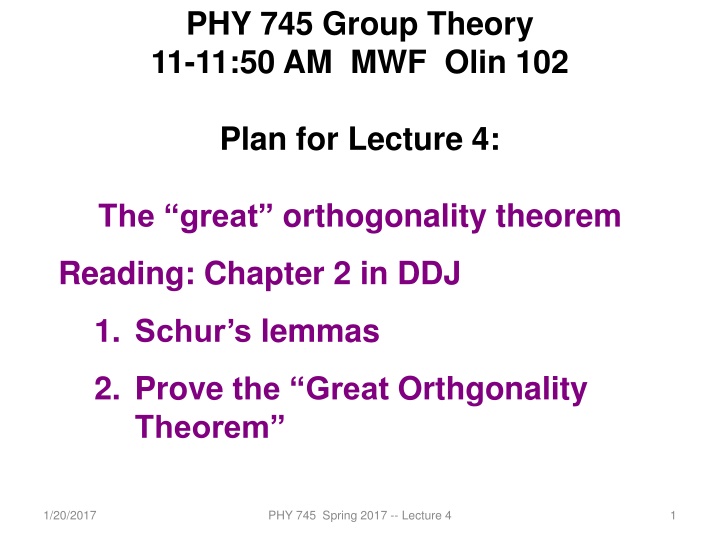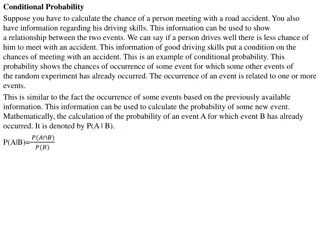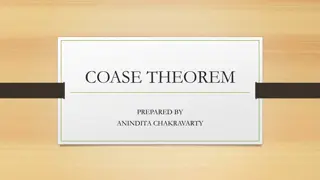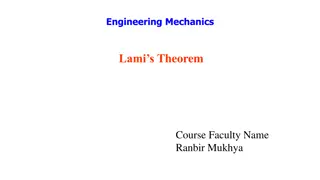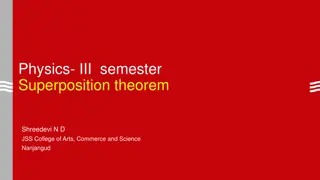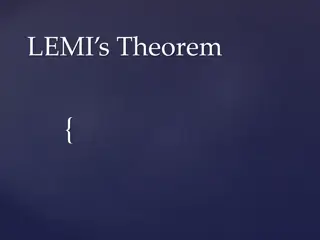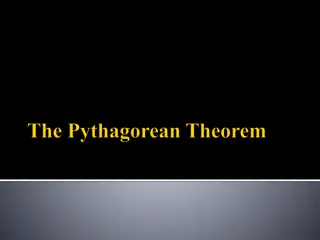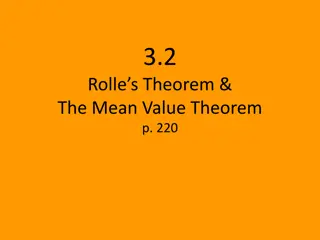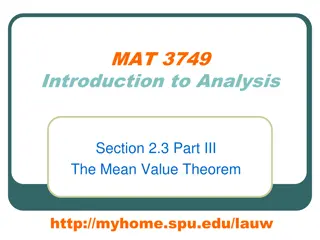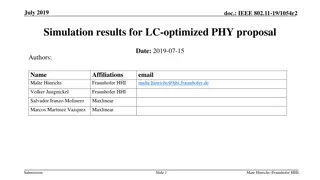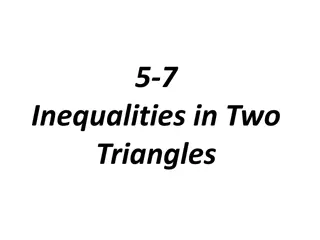PHY 745 Group Theory Lecture 4: Great Orthogonality Theorem
The Great Orthogonality Theorem in PHY 745 lecture 4, covering topics such as Schur's lemmas and proving the theorem. Delve into Chapter 2 of DDJ1 and enhance your understanding of this fundamental concept in physics. Join the discussion on 1/20/2017 at Olin room 102 to deepen your knowledge of group theory.
Download Presentation

Please find below an Image/Link to download the presentation.
The content on the website is provided AS IS for your information and personal use only. It may not be sold, licensed, or shared on other websites without obtaining consent from the author.If you encounter any issues during the download, it is possible that the publisher has removed the file from their server.
You are allowed to download the files provided on this website for personal or commercial use, subject to the condition that they are used lawfully. All files are the property of their respective owners.
The content on the website is provided AS IS for your information and personal use only. It may not be sold, licensed, or shared on other websites without obtaining consent from the author.
E N D
Presentation Transcript
PHY 745 Group Theory 11-11:50 AM MWF Olin 102 Plan for Lecture 4: The great orthogonality theorem Reading: Chapter 2 in DDJ 1. Schur s lemmas 2. Prove the Great Orthgonality Theorem 1/20/2017 PHY 745 Spring 2017 -- Lecture 4 1
1/20/2017 PHY 745 Spring 2017 -- Lecture 4 2
The great orthogonality theorem on unitary irreducible representations order of the group element of the group ( ) R Notation: h R i th representation of i R denote matrix indices imension of the representation d l i h ( ) * = i j ( ) R ( ) R ij l R i 1/20/2017 PHY 745 Spring 2017 -- Lecture 4 3
Proof of the great orthogonality theorem Prove that all representations can be unitary matrices Prove Schur s lemma part 1 any matrix which commutes with all matrices of an irreducible representation must be a constant matrix Prove Schur s lemma part 2 Put all parts together 1/20/2017 PHY 745 Spring 2017 -- Lecture 4 4
Proof of the great orthogonality theorem Prove that all representations can be unitary matrices Prove Schur s lemma part 1 any matrix which commutes with all matrices of an irreducible representation must be a constant matrix Prove Schur s lemma part 2 Put all parts together Schur s lemma part 1: A matrix M which commutes with all of the matrices of an irreducible representation must be a constant matrix: M=sI where s is a scalar constant and I is the identity matrix. 1/20/2017 PHY 745 Spring 2017 -- Lecture 4 5
Schurs lemmas part 1: A matrix M which commutes with all of the matrices of an irreducible representation must be a constant matrix: M=sI where s is a scalar constant and I is the identity matrix. Proof: Suppose is a diagonal matrix , the premise becomes M = = d i i ( ) R ( ) for all elements of the gro R d up d R ( ) ( ) i i ( ) R ( ) R d d kl kl ( ) )( = ( ) = i i ( ) R ( ) R d d kk ll kl kl ) ( = i ( ) 0 for all , and for al k l l d d R R kk l l k l i if ( ) is irre R duc ble i d ll d kk 1/20/2017 PHY 745 Spring 2017 -- Lecture 4 6
Example irreducible representation: 3 1 2 1 0 0 1 1 0 0 ( ) E ( ) A ( ) B = = = 2 3 3 3 1 3 1 2 2 3 3 3 1 2 1 2 1 2 ( ) C ( ) D ( ) F = = = 2 2 2 3 3 3 3 3 3 1 2 1 2 1 2 2 2 2 Extension of proof to more general matrix Note that i M H H + = : M = 1 2 + where H M M 1 ( ) = H i M M 2 In these terms, the premise is: ( ) ( ) + = + i i ( ) R ( ) R for all elements of the group H iH H iH R 1 2 1 2 1/20/2017 PHY 745 Spring 2017 -- Lecture 4 7
( ) ( ) + = + i i ( ) R ( ) R for all elements of the group H iH H iH R 1 2 1 2 = = i i i i ( ) R ( ) R H and ( ) R ( ) R H H H 1 1 2 2 Hermitian matrices can be diagonalized by a unitary transformation U = i i ( ) R ( ) R H for all UH U U U R 1 1 R = = i i ( ) R ( ) UH U U U U U UH U 1 ' ( ) R 1 i i ' ( ) ' ( ) for all is an equivalent representation of the group d R d R i where R The same construction ho lds for , H 2 1/20/2017 PHY 745 Spring 2017 -- Lecture 4 8
Proof of the great orthogonality theorem Prove that all representations can be unitary matrices Prove Schur s lemma part 1 any matrix which commutes with all matrices of an irreducible representation must be a constant matrix Prove Schur s lemma part 2 Put all parts together Schur's lemma part 2 Consider two irreducible representations of the same group Suppose there exists a re ctangular ( ) for all . It follows that either or ( ) and ( ) are equivalent. R R 1 2 ( ) with dimension R and ( ) w R ith dimensions . 1 2 matrix such tha t M 1 2 = 1 2 ( ) 0 M R R M R M 1 2 1/20/2017 PHY 745 Spring 2017 -- Lecture 4 9
Schur's lemma part 2 Consider two irreducible representations of the same group Suppose there exists a re ctangular ( ) for all . It follows that either or ( ) and ( ) are equivalent. R R 1 2 ( ) with dimension R and ( ) w R ith dimensions . 1 2 matrix such tha t M 1 2 = 1 2 ( ) 0 M R R M R M 1 2 = 1 2 S uppose ( ) R ( ) R M for all M R ( ) ( ) = 1 2 ( ) R ( ) R M M ( ) ( ) ) for all ( ) fo R = 2 1 ( ) R ( ) R M M 1 2 1 1 ( ) = = ( R M M R R 2 1 ( ) R M r a ll M R 1/20/2017 PHY 745 Spring 2017 -- Lecture 4 10
Schurs lemma part 2 -- continued 1 2 ( ) ( ) ( ) = ( ) ( ) M = 2 = for all ( ) for all ( ) ( ) R M M R R M R 2 1 R M M = = R R = = 2 2 1 ( ) ( ) R M M for all for all M R M MM R R MM R 2 1 1 M R M M R 2 1 M = 1 1 M M = 1 MM = 2 2 1/20/2017 PHY 745 Spring 2017 -- Lecture 4 11
Schurs lemma part 2 -- continued 2 2 ( ) ( ) From Schur's first lemma: = = ( ) ( ) R M M for all for all MM R R MM R 1 1 M M R R = = ( ) MM s I 2 2 2 ) Consider the case where ( M M s I 1 1 1 = = , it follows that 0 s s 1 2 1 2 ( ) otherwise there is an inconsistenc y MM M M = = C For the case onsider the case where that = , it follows that * s s 1 2 1 2 0 : s 1 0: = = 1 2 1 1 2 ( ) R ( ) R M ( ) Representations are eq ( ) R for all R uivalent M R M M For th c e a se that = s 1 MM 1/20/2017 PHY 745 Spring 2017 -- Lecture 4 0 0 M 12
Proof of the great orthogonality theorem Prove that all representations can be unitary matrices Prove Schur s lemma part 1 any matrix which commutes with all matrices of an irreducible representation must be a constant matrix Prove Schur s lemma part 2 Put all parts together h ( ) * = i j ( ) R ( ) R ij l R i 1/20/2017 PHY 745 Spring 2017 -- Lecture 4 13
Construct a matrix 2 1 1 2 1 ( ) R X ( ) M R R = 2 1 Note that: ( ) S M ( ) where is a member of the group S S M = 2 2 2 1 1 Details: ( ) S M ( ) S ( ) R X ( ) R R = 2 1 1 ( ) ( ) SR X R R = ) ( 2 1 1 1 1 1 ( ) ( ) ( ) S SR X R S R ( ) 1 = ) ( ) 2 1 1 ( ) ( SR X SR S R 1 = ( ) S M 1/20/2017 PHY 745 Spring 2017 -- Lecture 4 14
Proof continued: h ( ) * = i j ( ) R ( ) R ij l R i Construct a matrix 2 1 1 2 1 ( ) R X ( ) M R R = = 2 1 Since: for ( ) where is a member of the group 0 for arbitrary . Choosing particular indice X = ( ( ) R ( ) , S M M S S s: M 2 1 ( ) ( ) 2 1 1 2 1 1 ( ) R X ( ) ( ) ( ) R R R R R ) ( ) * = = 2 1 ( ) R 0 R 1/20/2017 PHY 745 Spring 2017 -- Lecture 4 15
h ( ) matrix * = i j Proof continued: ( ) R ( ) R ij l R i Construct a 2 1 1 2 1 ( ) R X ( ) M R R = 2 1 Since: fo r ( ) where is a member of the group for arbitrary . Choosing particular indices X = ( ) articular choice of : R ( ) S M M , M S S = = 2 1 : s I 1 1 1 ( ) R ( ) X R s R = = 1 1 1 For p ( ) X R R s s 1 = = = 1 1 1 ( ) ( ) E RR h h s 1 R h = s 1/20/2017 PHY 745 Spring 2017 -- Lecture 4 16 1
